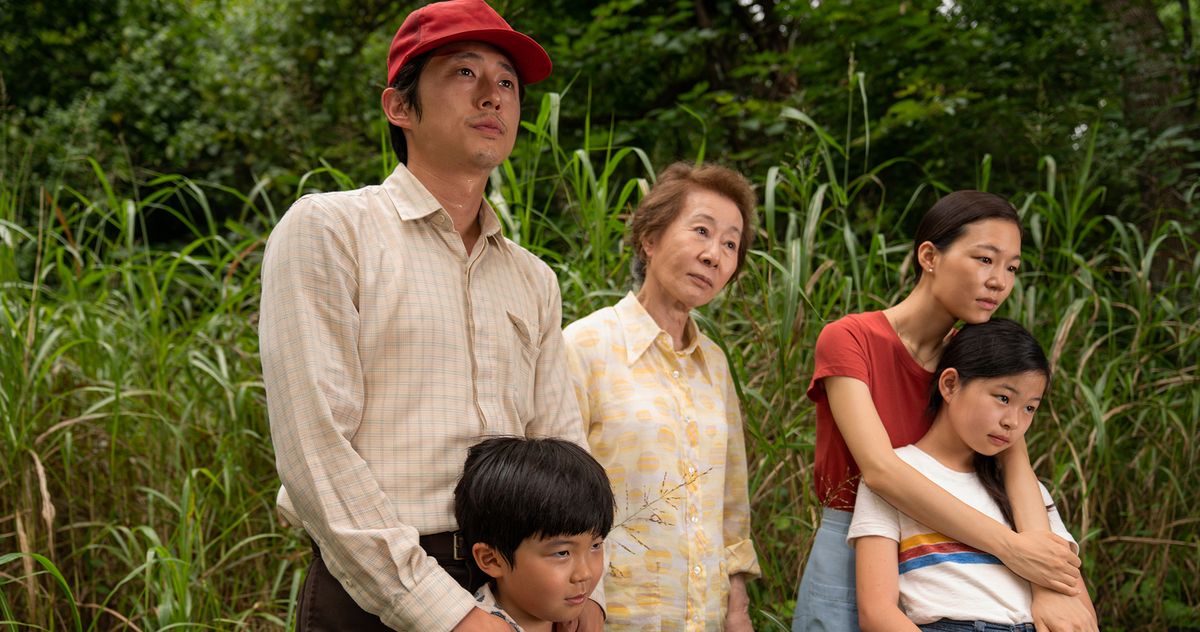ANDREA PLATE WRITES — “Everyone needs to have access both to grandparents and grandchildren in order to be a full human being.”
So wrote cultural anthropologist Margaret Mead, at least a half-century prior to the release of “Minari,” awarded “Best Foreign Film” by the Hollywood Foreign Press Association at the virtual Golden Globe ceremony recently. This indie film (A24 and Brad Pitt’s Plan B entertainment) follows a Korean-American family that tries to strike it rich as farmers in, most improbably, Arkansas.
Let’s skip to the end, first. In a searingly sentimental final scene, Grandma (Young Yuh-jung, dubbed the Meryl Streep of South Korea), heads off into the dark of night, alone. The family farm has just burned down. She (inadvertently) caused it. Her face a stroke- paralyzed mask, her arm permanently sentenced to life at a 90- degree angle, its wrist flapping like the broken wing of a bird, she stumbles on. Wordlessly.
Her feet say it all. In a stunning succession of close-ups, we see them move forward, step by step, one dirt-clod shoe followed by another, each leaving an imprint in the muddied Arkansas earth. Not since Marlon Brando’s final scene in 1954’s “On the Waterfront” has a pair of feet made such a cinematic mark.
“Grandma, where are you going?’ cries seven-year-old David (played by breakout child star Alan S. Kim), running after her in the dark.
They were not always so close. When she first flies in from her home country to help her daughter’s troubled brood, David retorts: “She smells like Korea.” Although born to Koreans, he is pridefully all-American. He later yells in her resolute face: “You’re not a real grandma! They bake cookies! They don’t swear!”
Grandma laughs. She smiles. How quickly this little one has adopted the cultural stereotypes and taboos of the West! How quickly he has learned to regard immigrants and elders with shame. But Grandma knows she can’t change the culture. And at age 73, she’s not about to change herself.
What she can do, as would any good grandmother, is show him unconditional love. And so, in one memorable scene, her hands (pre-stroke) gripping the boy’s tiny shoulders, she exclaims, “You’re a strong boy! Didn’t anyone tell you that?”
If Chinua Abe’s famed novel proves that, as per its title, “Things Fall Apart,” Grandma proves otherwise. She takes the many, messy fragmented parts of the Yi family puzzle—Dad, with his pipe dream to strike it rich in Arkansas; Mom, who threatens to take the kids and leave; Big Sister Anne, surrogate parent to David when Mom and Dad fall apart, as they often do—and puts them all back together. She is both the center of the family portrait and its frame.
Who better than writer/director Lee Isaac Chung to tell this tale? It is, for the most part, his life story. Born in Colorado to Korean-American immigrants, Chung’s family came to Arkansas in hopes of creating a beautiful, bountiful vegetable farm. How did the Chung family drama play out, in real life? We don’t know. “Minari,” though, tells us this: Fire may destroy a farm, but a family’s deepest love is indestructible.
As is a Grandma’s love and encouragement. While the parents’ consistent, cautionary refrain to their only son—“Don’t run, David!”— makes sense, given the child’s congenital heart defect, Grandma sees the whole person rather than the hole in the little boy’s heart. “Run!” she urges.
Fortunately, her word is his command. And so, in that final wrenching scene, David runs after his Grandma— furiously, fearlessly, in the dark of night. “Grandma!” he calls. “You’re going the wrong way!”
Ironically, by that point the hole in David’s heart has started to heal. Great news, says the doctor. Great luck, all agree. Or is there something else at work here, too? Can a grandmother’s love heal a broken heart? It would seem so.
“Minari” abounds in dry wit and dry humor, but a river of emotion runs through it. This is an immensely moving film, both tender and fierce, which will lift your spirits even as it pierces your heart—much like Grandma’s love. It is a valentine to family values in the deepest, truest, most apolitical sense, and a celebration of traditional Asian values. Have we lost our way? Should we all, in America, follow Grandma’s lead?

